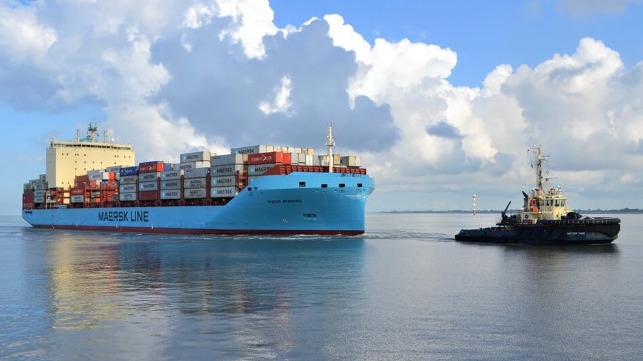Maersk and Svitzer to Learn from Green Methanol Fuel Cell Tug Project

Maersk is continuing its advocacy for methanol as the alternative fuel for the future of the maritime industry announced that Svitzer, its towage operator, will develop a tugboat powered by a green methanol fuel cell. Working with naval architects Robert Allan the companies become the latest in projects looking at using hydrogen fuel cells and batteries to eliminate emissions from tugboats.
Svitzer and Maersk are working closely together to determine technologies that support Maersk’s overall decarbonization strategy. According to the companies, the objective is to extract and apply knowledge and operational experience of methanol feasibility from the near shore small-scale tug onto larger ocean-going container vessels. The fuel cell tug will function as a pilot design for future Svitzer newbuilds and is planned to be put into operation within the Svitzer Europe region by the first quarter of 2024, shortly before Maersk is scheduled to launch the first of its ocean-going dual-fuel methanol-capable containerships.
“Fuel cells will be applicable as main propulsion power for tugs earlier than for larger vessels and further, the time to build a tug is significantly less than for a container vessel. Svitzer will obtain valuable knowledge and operational experience handling fuel cells as an alternative to diesel or pure electric power,” said Ingrid Uppelschoten Snelderwaard, Global COO for Svitzer. “We consider this project a significant step in Svitzer’s ambition to lead the decarbonization of towage and an important contribution to the joint efforts to develop solutions with a positive impact on the environment.”
The 80-ton bollard pull newbuild tug with escort notation will come with a hybrid-electric propulsion system solution where fuel cells can be dimensioned to deliver a specific amount of sustained bollard pull using fuel cells alone, adding additional power from the batteries during the short but often frequent peaks that characterize towage. The fuel cells can be used to charge the batteries when the tug is underway and when the tug is berthed, minimizing the need for expensive shore-side charging facilities. The combination of fuels cells and batteries the companies said will deliver a self-sustained tug with longer endurance and with less operational constraints than a pure battery-powered vessel.
“Fuel cell technology could be a disruptor in the maritime technology space, promising high efficiencies and eliminating the need for substantial amounts of pilot ignition fuels while removing harmful emissions,” said Ole Graa Jakobsen, Head of Fleet Technology for Maersk. “We have been monitoring the technology for the last few years, and with the accelerating developments in the ‘Power-to-X’ arena, it has become evident that we should step up our engagement in fuel cells, especially in combination with green methanol.”

that matters most
Get the latest maritime news delivered to your inbox daily.
The tugboat project builds on close cooperation between Svitzer and Maersk to jointly explore the combination of methanol fuel cells, batteries, storage/handling systems, electric drives, and propulsion units as a carbon-neutral alternative to the conventional fossil-fueled propulsion train.
In 2019, projects launched in Japan also exploring the combination of hydrogen fuel cells and batteries to power tugboats. TECO 2030 is also working with Dutch shipping company Chemgas Shipping on a hydrogen fuel cell tug, while several projects have also begun with all-electric battery-powered tugs. In June 2021, the Port of Antwerp reported that it had begun a first demonstration project using methanol to power a harbor tug. Svitzer and Maersk seek to go beyond these efforts using the Power-to-X technology using green methanol as the next advancement in marine power.
